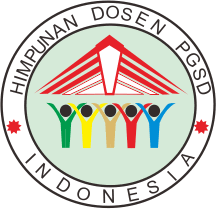Analisis kesulitan membaca tingkat lanjut dalam pembelajaran bahasa indonesia kurikulum merdeka
Abstract
The purpose of this study was to describe the advanced reading difficulties experienced by students in learning Indonesian in the independent curriculum of class IV SDN Jajar No 73 Surakarta in the academic year 2022/2023. This research uses descriptive qualitative research. The research subjects were fourth grade students at SDN Jajar No. 73 Surakarta. Data collection techniques in this study were interviews, observation, and document studies. The data analysis technique used is Miles and Huberman's interactive analysis which consists of data reduction, data presentation, verification, and drawing conclusions. The technique for testing the validity of the data uses technical triangulation. Analysis of advanced reading difficulties in learning Indonesian in the independent curriculum, found that fourth grade students still had difficulty learning advanced reading, especially at the creative reading level. The internal causal factors are learning motivation and language development. External causal factors are culture and environment. Efforts that can be made to help students' difficulties are by means of additional learning media with independent curriculum projects, using learning strategies that further develop student creativity, getting used to literacy programs.
Keywords
Full Text:
PDFReferences
Referensi [1] Hery Guntur Tarigan, MEMBACA Sebagai suatu keterampilan berbahasa. Bandung: Angkasa, 2008. [2] S. Sunarti, Pembelajaran Membaca, 1st ed. Pekalongan: PT Nasya Ekspanding Management, 2021. [3] Y. Hardiyana, “PROSES PEMBELAJARAN KEMAMPUAN MEMBACA LANJUT SISWA SEKOLAH DASAR (STUDI KASUS SISWA KELAS IVA SD BRAWIJAYA SMART SCHOOL MALANG,” no. 12, pp. 1–23, 2019. [4] E. Harianto, “‘Keterampilan Membaca dalam Pembelajaran Bahasa,’” J. Didakt., vol. 9, no. 1,p. 2, 2020, [Online]. Available: https://jurnaldidaktika.org/ [5] R. P. W. Lestari, Rukayah, and S. Kamsiyati, “Analisis kesulitan membaca pemahaman pada peserta didik kelas v sekolah dasar,” J. UNS Univ. Sebel. Maret, vol. 9, no. 449, pp. 1053– 1067, 2021, doi: 10.17977/um065v2i112022p1053-1067. [6] D. angga, cucu suryana, ima nurwahidah, “Potret Kurikulum Merdeka, Wujud Merdeka Belajar di Sekolah Dasar,” J. basicedu, vol. 6, no. 4, pp. 5877–5889, 2022, [Online]. Available: https://doi.org/10.31004/basicedu.v5i4.1230 [7] F. Fauzi, “Karakteristik Kesulitan Belajar Membaca Pada Siswa Kelas Rendah Sekolah Dasar,” Perspekt. Ilmu Pendidik., vol. 32, no. 2, pp. 95–105, 2018, doi: 10.21009/pip.322.2. [8] D. A. Windiasari, C. Wiarsih, and Y. Febrianta, “Kesulitan Membaca Pemahaman Peserta Didik Di Kelas Iva Sd Negeri 1 Karangnanas,” J. IKA PGSD (Ikatan Alumni PGSD) UNARS, vol. 9, no. 1, p. 239, 2021, doi: 10.36841/pgsdunars.v9i1.1034. [9] Sugiyono, Metode penelitian Kuantitatif, Kualitatif, dan RnD, 2nd ed. Bandung: ALFABETA, 2019. [10] lahir M. Zuldarial, Penelitian Kualitatif, 2nd ed. Surakarta: Yuma Pustaka, 2012. [11] A. Kholiq and U. I. Lamongan, “PENCAPAIAN HIGH ORDER THINGKING SKILLS ( HOTS ) DALAM MEMBACA PEMAHAMAN MAHASISWA UNIVERSITAS,” vol. 2, no. 2, pp. 1–7, 2019. [12] L. T. S. Jati and W. Sumarni, “Dampak Pandemi Covid-19 Terhadap Perkembangan Anak Sekolah Dasar,” Pros. Semin. Nas. Pascasarj., vol. 3, no. 1, pp. 777–783, 2020, [Online]. Available: https://proceeding.unnes.ac.id/index.php/snpasca/article/download/667/585 [13] O. Rombot, E. Boeriswati, and M. A. Suparman, “Improving Reading Comprehension Skills of International Elementary School Students through Blended Learning,” Al Ibtida J. Pendidik. Guru MI, vol. 7, no. 1, p. 56, 2020, doi: 10.24235/al.ibtida.snj.v7i1.6045. [14] D. Abdullah, “BIMBINGAN BELAJAR BAGI SISWA BERKESULITAN MEMBACA Dahliana,” Nucl. Phys., vol. 13, no. 1, pp. 104–116, 2016. [15] M. H. Sari, Susetyo, Noermanzah, D. E. C. Wardhana, and D. Kusumaningsih, “Understanding the level of students’ reading comprehension ability,” Univers. J. Educ. Res., vol. 8, no. 5, pp. 1848–1855, 2020, doi: 10.13189/ujer.2020.080521.
Refbacks
- There are currently no refbacks.



